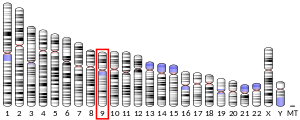Stomatin
Stomatin also known as human erythrocyte integral membrane protein band 7 is a protein that in humans is encoded by the STOM gene.[5][6]
Clinical significance
Stomatin is a 31 kDa integral membrane protein, named after the rare human haemolytic anaemia hereditary stomatocytosis. This gene encodes a member of a highly conserved family of integral membrane proteins. The encoded protein localizes to the cell membrane of red blood cells and other cell types, where it may regulate ion channels and transporters. Loss of localization of the encoded protein is associated with hereditary stomatocytosis, a form of hemolytic anemia.[6]
Function
This gene encodes a member of a highly conserved family of integral membrane proteins. The encoded protein localizes to the cell membrane of red blood cells and other cell types, where it may regulate ion channels and transporters. Loss of localization of the encoded protein is associated with hereditary stomatocytosis, a form of hemolytic anemia.[6]
Although the wide distribution of stomatin and its constitutive expression suggest an important role for this protein in cell biology, perhaps as a “house-keeping” component, its function remains undetermined. The massive presence of stomatin in membrane-protruding folds and extensions suggests a possible structural role for this protein in the formation of these structures and/or the anchorage to the actin cytoskeleton.
References
- ^ a b c GRCh38: Ensembl release 89: ENSG00000148175 – Ensembl, May 2017
- ^ a b c GRCm38: Ensembl release 89: ENSMUSG00000026880 – Ensembl, May 2017
- ^ "Human PubMed Reference:". National Center for Biotechnology Information, U.S. National Library of Medicine.
- ^ "Mouse PubMed Reference:". National Center for Biotechnology Information, U.S. National Library of Medicine.
- ^ Hiebl-Dirschmied CM, Entler B, Glotzmann C, Maurer-Fogy I, Stratowa C, Prohaska R (Oct 1991). "Cloning and nucleotide sequence of cDNA encoding human erythrocyte band 7 integral membrane protein". Biochim Biophys Acta. 1090 (1): 123–4. doi:10.1016/0167-4781(91)90047-P. PMID 1883838.
- ^ a b c "Entrez Gene: STOM stomatin".
Further reading
- Stewart GW (1997). "Stomatin". Int. J. Biochem. Cell Biol. 29 (2): 271–4. doi:10.1016/S1357-2725(96)00072-6. PMID 9147127.
- Stewart GW, Hepworth-Jones BE, Keen JN, et al. (1992). "Isolation of cDNA coding for an ubiquitous membrane protein deficient in high Na+, low K+ stomatocytic erythrocytes". Blood. 79 (6): 1593–601. PMID 1547348.
- Gallagher PG, Forget BG (1995). "Structure, organization, and expression of the human band 7.2b gene, a candidate gene for hereditary hydrocytosis". J. Biol. Chem. 270 (44): 26358–63. doi:10.1074/jbc.270.44.26358. PMID 7592848.
- Salzer U, Ahorn H, Prohaska R (1993). "Identification of the phosphorylation site on human erythrocyte band 7 integral membrane protein: implications for a monotopic protein structure". Biochim. Biophys. Acta. 1151 (2): 149–52. doi:10.1016/0005-2736(93)90098-K. PMID 8373790.
- Westberg JA, Entler B, Prohaska R, Schröder JP (1993). "The gene coding for erythrocyte protein band 7.2b (EPB72) is located in band q34.1 of human chromosome 9". Cytogenet. Cell Genet. 63 (4): 241–3. doi:10.1159/000133542. PMID 8500356.
- Unfried I, Entler B, Prohaska R (1997). "The organization of the gene (EPB72) encoding the human erythrocyte band 7 integral membrane protein (protein 7.2b)". Genomics. 30 (3): 521–8. doi:10.1006/geno.1995.1273. PMID 8825639.
- Snyers L, Thinès-Sempoux D, Prohaska R (1997). "Colocalization of stomatin (band 7.2b) and actin microfilaments in UAC epithelial cells". Eur. J. Cell Biol. 73 (3): 281–5. PMID 9243190.
- Mayer H, Salzer U, Breuss J, et al. (1998). "Isolation, molecular characterization, and tissue-specific expression of a novel putative G protein-coupled receptor". Biochim. Biophys. Acta. 1395 (3): 301–8. doi:10.1016/s0167-4781(97)00178-4. PMID 9512664.
- Snyers L, Umlauf E, Prohaska R (1998). "Oligomeric nature of the integral membrane protein stomatin". J. Biol. Chem. 273 (27): 17221–6. doi:10.1074/jbc.273.27.17221. PMID 9642292.
- Snyers L, Umlauf E, Prohaska R (1999). "Cysteine 29 is the major palmitoylation site on stomatin". FEBS Lett. 449 (2–3): 101–4. doi:10.1016/S0014-5793(99)00417-2. PMID 10338112.
- Zhang JZ, Hayashi H, Ebina Y, et al. (1999). "Association of stomatin (band 7.2b) with Glut1 glucose transporter". Arch. Biochem. Biophys. 372 (1): 173–8. doi:10.1006/abbi.1999.1489. PMID 10562431.
- Mairhofer M, Steiner M, Mosgoeller W, et al. (2002). "Stomatin is a major lipid-raft component of platelet alpha granules". Blood. 100 (3): 897–904. doi:10.1182/blood.V100.3.897. PMID 12130500.
- Feuk-Lagerstedt E, Samuelsson M, Mosgoeller W, et al. (2002). "The presence of stomatin in detergent-insoluble domains of neutrophil granule membranes". J. Leukoc. Biol. 72 (5): 970–7. PMID 12429719.
- Strausberg RL, Feingold EA, Grouse LH, et al. (2003). "Generation and initial analysis of more than 15,000 full-length human and mouse cDNA sequences". Proc. Natl. Acad. Sci. U.S.A. 99 (26): 16899–903. doi:10.1073/pnas.242603899. PMC 139241. PMID 12477932.
- Basrur V, Yang F, Kushimoto T, et al. (2003). "Proteomic analysis of early melanosomes: identification of novel melanosomal proteins". J. Proteome Res. 2 (1): 69–79. doi:10.1021/pr025562r. PMID 12643545.
- Fricke B, Argent AC, Chetty MC, et al. (2003). "The "stomatin" gene and protein in overhydrated hereditary stomatocytosis". Blood. 102 (6): 2268–77. doi:10.1182/blood-2002-06-1705. PMID 12750157.
- Green JB, Fricke B, Chetty MC, et al. (2005). "Eukaryotic and prokaryotic stomatins: the proteolytic link". Blood Cells Mol. Dis. 32 (3): 411–22. doi:10.1016/j.bcmd.2004.01.016. PMID 15121101.
- Humphray SJ, Oliver K, Hunt AR, et al. (2004). "DNA sequence and analysis of human chromosome 9". Nature. 429 (6990): 369–74. doi:10.1038/nature02465. PMC 2734081. PMID 15164053.
External links
- Overview of all the structural information available in the PDB for UniProt: P54116 (Mouse Erythrocyte band 7 integral membrane protein) at the PDBe-KB.
This article incorporates text from the United States National Library of Medicine, which is in the public domain.






